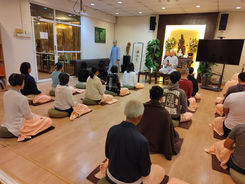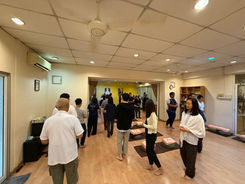

正信佛友会
Zheng Xin Buddhist Association



【继持法师】
《一日禅|止观法门》
讲师 Speaker:
【继持法师】
翻译员 Translator:
【None 没有】
Dec 27, 2025
12:00 AM
-
10:30 AM

27-12-2025:
【一日禅|止观法门】
【One-Day Meditation Retreat – Practice of Samatha–Vipassana】
🧘🏻💧🧘🏻💧🧘🏻💧🧘🏻💧🧘🏻💧🧘🏻💧🧘🏻💧🧘🏻💧🧘🏻💧🧘🏻💧🧘🏻💧🧘🏻💧🧘🏻💧🧘🏻💧🧘🏻
⚡ 此次活动由 「继持法师」主持,「显宏法师」与 「显禅法师」 协助指导下, 引导学员深入体验正念修持、安住身心的禅修方法。
🕊 活动流程回顾
🔹 08:00 报到
🔸 08:45 简要说明
🔹 09:00 – 12:00 禅修方法讲解、静坐禅修、身心练习、礼佛
🔸 12:00 – 13:30 素食自助午餐(素咖喱羊、清煮花椰菜、甜酸炸菇、素鱼饼、水果等)与休息。
🔹 13:30 – 16:00 禅修方法讲解、静坐禅修、身心练习、行禅。
🔸 16:00 – 16:20 茶歇(咖啡、茶饮、面包、饼干自由享用)。
🔹 16:20 – 18:00 禅修方法讲解、静坐禅修、身心练习、行禅。
🔸 18:00 – 18:30 礼佛、回向功德、大合照。
🔹 18:30 – 19:00 撰写当日修习反思。
🔸 19:00 圆满结束,道别。
🌿 修习重点:
本次禅修课程系统而严谨,内容涵盖:
▪️禅修的利益与意义。
▪️正确的禅修方法与心态建立。
▪️身体准备与端正的坐姿。
▪️专注力的培养。
▪️行禅的方法。
▪️禅前与禅后的身体伸展与练习。
▪️礼佛的学习。
▪️从入座到离座的威仪与恭敬礼仪。
⚡ 为护持正念与内观体验,全程禁语,让学员在宁静中深入观察身心变化,体会止观并行的修行力量。
🙏 愿此次「一日禅」所集之清净功德,回向法界众生,身心安稳,智慧增长,福慧双修。
⚡This 「One Day Meditation Retreat」 was guided by a 「Venerable Ji Chi」, assisted by「Venerable Xian Hong」 & 「Venerable Xian Chan」guiding participants to cultivate mindfulness, calmness, and insight into Meditation.
🕊 Programme Highlights:
🔹08:00am: Registration
🔸08:45am: Briefing
🔹09:00am – 12:00noon: Meditation methodology, seated meditation, body–mind exercises, bowing to the Buddha
🔸12:00noon – 13:30pm: Vegetarian buffet lunch (vegetarian curry “mutton”, boiled cauliflower, sweet-and-sour fried mushrooms, vegetarian fish cakes, fruits etc.) and rest
🔹13:30pm – 16:00pm: Meditation methodology, seated meditation, body–mind exercises, walking meditation
🔸16:00pm – 16:20pm: Tea break (free flow of coffee, tea, drinks, bread, and biscuits)
🔹16:20pm – 18:00pm: Meditation methodology, seated meditation, body–mind exercises, walking meditation
🔸18:00pm – 18:30pm: Bowing to the Buddha, dedication of merits, group photo
🔹18:30pm – 19:00pm: Writing reflections on the day’s practice
🔸19:00pm: Conclusion and farewell
🌿 Core Teachings & Practice of meditation methodology focused on:
▪️The benefits and purpose of meditation.
▪️Proper meditation techniques and preparation.
▪️Posture and physical readiness
▪️Cultivating concentration and mindfulness.
▪️Methods of walking meditation.
▪️Physical exercises before and after meditation.
▪️Learning the practice of bowing to the Buddha.
▪️Observing respectful etiquette and mindfulness from entering to leaving the meditation hall.
⚡To support deep inner awareness, silence was observed throughout the entire retreat, allowing participants to turn inward and experience Samatha and Vipassana in harmony.
🙏 May the merits from this retreat be dedicated to all beings, bringing peace, clarity, and the growth of wisdom and compassion.
























